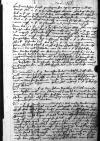List #5957
Georg HEGEL do Ioannes DANTISCUSCracow (Kraków), 1539-03-18
| odebrano 1539-03-28 Rękopiśmienne podstawy źródłowe:
Pomocnicze podstawy źródłowe:
| ||||||
Tekst + aparat krytyczny + komentarz Zwykły tekst Tekst + komentarz Tekst + aparat krytyczny
 AAWO, AB, D.95, f. [2] missed in numbering after f. 107
AAWO, AB, D.95, f. [2] missed in numbering after f. 107
Dem hochwirdigenn fürst vnnd hernn, hernn
Helspergk
Hoch wirdiger furst, gendiger her.
Main gantz willig dienst sein e f g zu allerzeytt berait.
Gnediger her.
Ich hab e f g auff 26 febr(er) am nechsten cf.
Item die 150, so e f g zu
Item der her
Item vernomen e f g den
Item vernym e f g dem herren
Item e f g wirdt vernomen habnn, das vnser landttag am ende hatt etlich herren darzu verordnett, die sollich gelt sollnn empfohen vnd ausgeben. Man sagt von 40 M Thatern, die am schwartzen wald ligen, so pald der schnee abgath, wöll sy heraus auff vns. Man nympt ja folck auff, got gebe das es nicht ze spett werd. Aus Vngern hört man noch nichtz, der Turck rist sich starck zu last prucken machen. Es ist ain beysorg darbey, das er nicht durch Polen in die schles ziech. Der almechtig gott wölle es verhiethen, wir weren zum widerstand ze schwach. Vnser leyth sein auch von Ofen noch nicht widerkomen. Von der hochzytt das ich e f g nicht kan schreyben, was sich do gehaben hatt, man hatt  AAWO, AB, D.95, f. 106v vorhofft, das do solt ain gemainer frid sein ausgeriefn worden. Do hört man noch nichtz darvon, der almechtiger Got schick es zum pösten.
AAWO, AB, D.95, f. 106v vorhofft, das do solt ain gemainer frid sein ausgeriefn worden. Do hört man noch nichtz darvon, der almechtiger Got schick es zum pösten.
Item die öl sein mir worden, wie ich e f g das nechst mol anzaigt hab, dem hern
Amen.
Datum zu
E f g gantz williger


